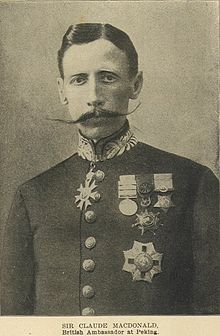|
Claude Maxwell MacDonald
Colonel Sir Claude Maxwell MacDonald, GCMG, GCVO, KCB, PC (12 June 1852 – 10 September 1915) was a British soldier and diplomat, best known for his service in China and Japan.[1] Early lifeMacDonald was born the son of Mary Ellen MacDonald (nee Dougan) and Major-General James (Hamish) Dawson MacDonald.[2] He was educated at Uppingham School and Sandhurst. He was commissioned into the 74th Foot in 1872. He thought of himself as a "soldier-outsider", as regards his subsequent career in the Foreign Office. AfricaMacDonald’s early career was in Africa. He served in the 1882 Anglo-Egyptian War, and served as military attaché to Sir Evelyn Baring from 1884 to 1887. From 1887 to 1889, he was Acting-Agent and Consul-general at Zanzibar, and then served some years as Commissioner and Consul-General at Brass in the West African Oil Rivers Protectorate,[3] where in 1895 he was an observer of the rebellion of King Koko of Nembe.[4] He retired from the British Army in 1896.[2] China and KoreaIn 1896, MacDonald was appointed Her Majesty's Minister in China. He was simultaneously the British Minister to the Empire of Korea in 1896 through 1898.[5]  In China, MacDonald obtained a lease at Weihaiwei, and obtained railway contracts for British syndicates. He was instrumental in securing the Second Peking Convention, by which China leased to Britain the New Territories of Hong Kong.[3] MacDonald secured a 99-year lease only because he thought it was "as good as forever".[6] This and the contrasting lease-in-perpetuity of Kowloon created some problems in the negotiations for the 1984 Sino-British Joint Declaration. In 1899 MacDonald was the author of a diplomatic note which he proposed, on behalf of British India, a boundary line between Jammu and Kashmir and the Chinese Turkestan, ceding roughly half of the Aksai Chin plateau, in return for China relinquishing its shadowy suzerainty over Hunza. The proposed boundary came to be known as the Macartney–MacDonald Line. The Qing China never made any response to the proposal. But the proposed boundary is still seen by scholars and commentators to have some relevance to the present day boundary disputes between China and India. As a military man, MacDonald led the defence of the foreign legations in 1900 which were under siege during the Boxer Rebellion, and he worked well with the Anglophile Japanese colonel Shiba Gorō.[7] JapanMacDonald was appointed Consul-General to the Empire of Japan in October 1900.[8] He headed the British Legation in Tokyo during a period of harmonious relations between Britain and Japan (1900 to 1912), swapping appointments with Sir Ernest Satow who replaced him as Minister in Peking. On 30 January 1902, the first Anglo-Japanese Alliance was signed in London between the Foreign Secretary Lord Lansdowne and Hayashi Tadasu, the Japanese Minister.  MacDonald was still in Tokyo when the alliance was renewed in 1905 and 1911. He became Britain's first ambassador to Japan when the status of the legation was raised to that of embassy in 1905. Before 1905 the senior British diplomat in Japan had simultaneously held the joint positions of (a) Consul-General and (b) Envoy Extraordinary and Minister Plenipotentiary; the latter being a rank just below that of ambassador. MacDonald was made a Privy Councillor in 1906.[9] He died of heart failure at his residence in London on 10 September 1915.[10][11] He is buried with his wife in Brookwood Cemetery. Ethel, Lady MacDonald, DBE In 1892, MacDonald wed Ethel (1857–1941), daughter of Major W. Cairns Armstrong; they remained married until his death in 1915.[12] They had two daughters. Awarded the Royal Red Cross (RRC) and a Member of the Executive Committee of the Overseas Nursing Association, Lady MacDonald was named Dame Commander of the Order of the British Empire (DBE) in her own right in 1935.[13] Selected worksIn a statistical overview derived from writings by and about MacDonald, OCLC/WorldCat encompasses roughly 10+ works in 20+ publications in 2 languages and 300+ library holdings.[14]
Honours
See alsoNotes
References
External linksWikimedia Commons has media related to Claude Maxwell MacDonald.
|
||||||||||||||||||||||||||||||||||||||||||||||||||
